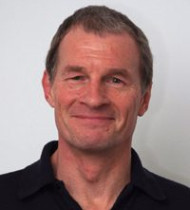4th Biennial Conference on Religion and Politics
A new, even more brave world...
The hope of faith and the hope of politics
In memory of Benedict XVI
30 November - 1 December 2023
Idea and aim
We live in a time when the idea of a “new world order” has unexpectedly returned to the mainstream of public discussion. On the one hand, the projects of the “Great Reset” or the new world order after the pandemic, and on the other hand, terrifying images of the fight for the “Russian world” and the fear of the hanging hecatomb of the World War shape the social imaginary. It seems that the rebirth of various visions of a new, better world in a context marked by existential fear, disturbingly consonant with the constructivist recognition of imagining things “different, better than they are” as the basis of social changes, is worth a deeper analysis precisely in the perspective of the political science of religion. Ultimately, they send us back to the question of hope: What we can legitimately hope for and what we can’t.
- 30 November - 1 December 2023
- 9.00 - 18.00
- Warsaw, Poland
- The Institute of Political Science and Public Administration of the Cardinal Stefan Wyszyński University in Warsaw (Poland)

In the above context, we would like to devote this year’s edition of the conference on the political science of religion – starting from the widely discussed concepts of “new world order” – to the question of the shape of political and eschatological hopes. What seems important here is the ability to distinguish the legitimate promises of politics from those that constitute a dangerous temptation to realize the “Kingdom of God” in earthly times. The question then arises how to distinguish between this true and false promise, and whether and to what extent religion can be helpful in this? Is the longing for a “better world” contained in religious faith a threat to a policy that respects human dignity, or rather its protection? Does religion ex definitione protect against totalitarian political aspirations, or on the contrary? Or maybe only some religions (if so, whether and according to what criteria they can be distinguished) play a positive political role? What does the “positive role” of religion mean (and what should it mean) from the point of view of political science? In the thicket of questions arising around the issue of messianic hopes, a special guide seems to be the thought of Pope Benedict XVI, who died at the beginning of this year. Therefore, we would like to make it the prism of our reflection.
In accordance with our tradition, we invite you to submit proposals for papers in the field of current scientific research in the field of religion and politics, which will be discussed during panel sessions. In particular, we encourage you to take up topics related to the central issues of the conference, which will be discussed during the plenary panels.
Keynotes

Tracey Rowland
is a political philosopher and theologian, professor at the University of Notre Dame Australia. Between 2001 and 2017 she was the Dean of the John Paul II Institute for Marriage and Family in Melbourne. She is a member of the editorial board of Communio: International Catholic Review and was appointed to the 9th International Theological Commission in 2014. In 2009 she was awarded the Archbishop Michael J Miller Award for the Promotion of Faith and Culture by the University of St. Thomas in Houston and in 2010 she was awarded the Officer’s Cross of the Order of Merit of the Republic of Poland. In 2020 she won the Ratzinger Prize for theology.
She has published over 150 articles. Her books include: Culture and the Thomist Tradition (London: Routledge, 2003), Ratzinger’s Faith: The Theology of Benedict XI (Oxford University Press, 2008), Benedict XVI: A Guide for the Perplexed (London: Bloomsbury, 2010),Catholic Theology (London: Bloomsbury, 2017), The Culture of the Incarnation: Essays in Catholic Theology (Steubenville: Emmaus Academic, 2017), Portraits of Spiritual Nobility (New York: Angelico, 2019) Beyond Kant and Nietzsche: The Munich Defence of Christian Humanism (London: Bloomsbury, 2021).
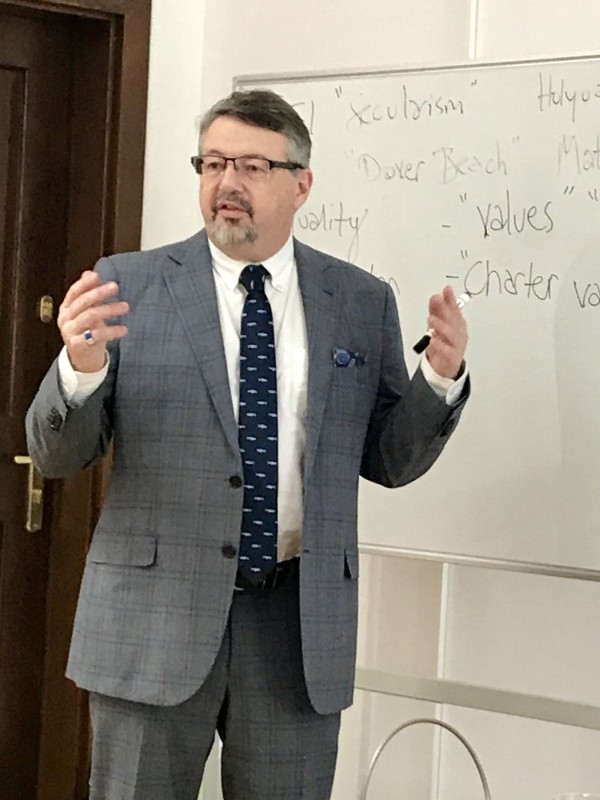
Iain Benson
is a professor at the University of Notre Dame Australia and practicing lawyer in constitutional law and human rights with particular focus on freedoms of association, conscience and religion, the nature of pluralism, multi-culturalism and relationships between law, religion and human rights. He was one of the drafters of the South African Charter of Religious Rights and Freedoms (signed by all major religions in that country in September 2010). He is inter alia a member of International Consortium for Law and Religion Studies (Milan), Virginia, USA, and extraordinary Professor at Department of Constitutional Law and the Department of Philosophy of Law, University of the Free State, South Africa.
His books include: Living Together with Disagreement: Pluralism, the Secular and the Fair Treatment of Beliefs in Law Today, (Ballan, Australia: Connor Court Publishing, 2012), Iain T. Benson and Barry W. Bussey, (eds). “Religion, Liberty and the Jurisdictional Limits of Law,” (Lexis Nexis, 2017).

Grégor Puppinck
is Director of the European Centre for Law and Justice (ECLJ).
In 2016, he was appointed member of the Panel of Experts on Freedom of Religion or Belief of the OSCE/ODIHR which role is to support OSCE participating States in implementing their commitments on the right to freedom of religion or belief.
Since 2000, he regularly serves as an expert representing the Holy See in committees of the Council of Europe, currently in the Committee of experts on the System of the European Convention on Human Rights (DH-SYSC), under the Steering Committee for Human Rights (CDDH).
Between 2003 and 2012, Grégor Puppinck has lectured human rights, international and constitutional law at the Law School of the Universities of Mulhouse and Strasbourg.
He is the author of several books and numerous legal articles published in several languages
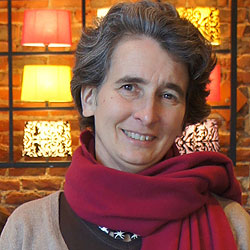
Marguerite A. Peeters
is the Director of the Brussels-based Institute for Intercultural Dialogue Dynamics, which studies the key concepts, values and operational mechanisms of globalisation and promotes an open intercultural dialogue on these issues. As a journalist, she has directed since 1995 Interactive Information Services (IIS), which monitors and analyses the emergence of the post-Cold War paradigms of international co-operation and global governance. In 2001 Marguerite published a major analytical study “Hijacking democracy – the power shift to the unelected”. She also freelances for a number of European and international publications.
Call for papers
We invite you to submit papers for the conference. They may be devoted to issues described within the conference idea (bookmark “Idea and aim“). We also invite you to present the current research in the field of political science of religion. As we have in the tradition of our conferences, alongside the main sessions, there will be parallel panels on current research on religion and politics. See the description of the proposed panels
Applications should include the title of the presentation along with the abstract (max. 300 words).
The conference will be held in Polish and English. We provide simultaneous translation for plenary sessions. Parallel panels will be held in one of the two languages mentioned.
Proposals for presentations should be sent via the application form on the conference website www.religionandpolitics.pl.
There are two options for the submission deadline. If you send your application by July 15, 2023, you will receive a decision on acceptance your application by July 30, 2023. If you send your application by October 15, 2023, you will receive a decision on acceptance by October 30, 2023.
Programme conference
View the full conference programme here
Programme Committee
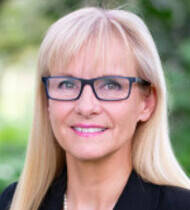
Professor of Law at Ave Maria School of Law in Naples, Florida and Adjunct Professor at the School of Law at Notre Dame University in Sydney, Australia
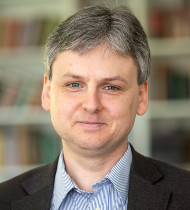
associate professor of political science at the Cardinal Stefan Wyszynski University in Warsaw, chair of the Programme Committee of the conference
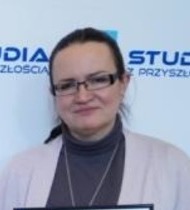
associate professor of political science at the Institute of Political Sciences of the University of Opole.

professor of social sciences at the Cardinal Stefan Wyszynski University in Warsaw, sociologist

professor of humanities at the Cardinal Stefan Wyszynski University in Warsaw, theologian, and specialist in political science

professor of humanities at the University of Zielona Góra, historian, and political science specialist

associate professor of political science at Pázmány Péter Catholic University and senior researcher of religion and society at the University of Public Service, Budapest

Senior Lecturer in International Relations and Director of the Freedom of Religion or Belief &Foreign Policy Initiative at the University of Sussex

doctor of humanities and political science specialist; Adjunct Professor of the Institute of International Relations of the University of Warsaw

professor of humanities at the Cardinal Stefan Wyszynski University in Warsaw, sociologist, and political science specialist
Conference organizers

The Institute of Political Science and Public Administration of the Cardinal Stefan Wyszyński University in Warsaw

Collegium Interethnicum
Conference co-organizers

The Faculty of Political Science and International Relations of the University of Warsaw

The Institute of Political Science of the University of Opole
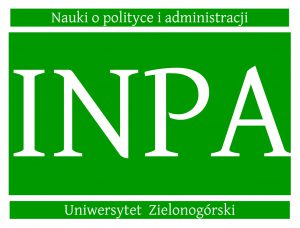
The Institute of Political Science and Public Administration of the University of Zielona Góra
Conference partners
Archival
The following conferences were held in the series devoted to the relations between religion and politics:
Relations between religion and politics as a subject of research of political science
- 30 November – 1 December 2017
- Idea and aim
- Conference programme
Secularism as a challenge for politics and political science
- 12-13 December 2019
- Idea and aim
- Conference programme
- Abstracts
- Lecture given by Professor Joseph Weiler
Religion and Politics in the Context of "Epochal Change"
Conference details
The conference will be organized in Warsaw, Poland. We also offer the possibility of online-only participation (but we prefer in person participation). The fee for participating online is the same as for participating in person.
Conference fees:
The conference fee is 100 Euros (for those who submit their applications by July 15) or 125 Euros (for those who submit their applications by October 15).
The fee covers the cost of meals (lunch 30 November, dinner 30 November, lunch 1 December) and coffee breaks. The costs of travel and accommodation are not included.
Bank account for payment:
Collegium Interethnicum, 32/4 Fasolowa Street, 02-482 Warsaw, Poland
IBAN: PL 24 1050 1012 1000 0090 8224 6845 (ING Bank Ślaski)
SWIFT (BIC code): INGBPLPW
The transfer title: Surname. Religon and Politics
Accomodation:
Participants make their own arrangements.
Organizing committee:
- Michał Gierycz – chair (m.gierycz@gmail.com)
- Mariusz Sulkowski – secretary (m.sulkowski@uksw.edu.pl)
- Patrycja Laszuk – secretary (p.laszuk@uksw.edu.pl)
- Piotr Burgoński (burgonski@onet.eu)
Conference venue:
The Institute of Political Science and Public Administration of the Cardinal Stefan Wyszyński University in Warsaw (Poland)
1/3 Wóycickiego Street, Warsaw, building no. 23, room 201, second floor (www.politologia.uksw.edu.pl)
Maps:
